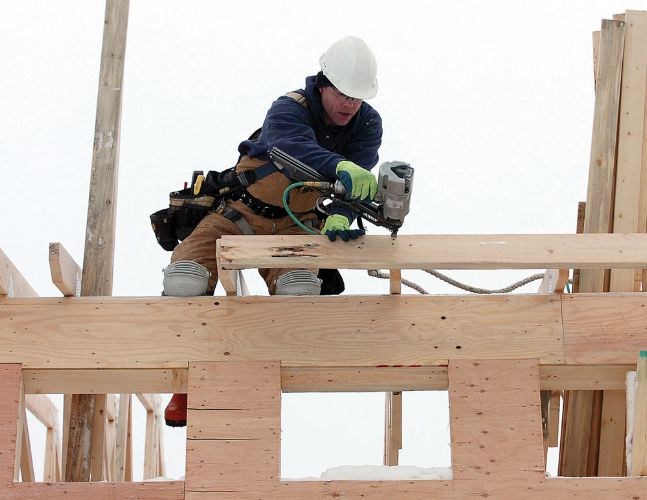A looming stress test for uninsured mortgages is poised to put a dent in the city's real-estate and house-building activities.
Starting in January, a new minimum qualifying rate for uninsured mortgages - open to consumers who can come up with a down payment of at least 20 per cent - will be the greater of the five-year benchmark rate published by the Bank of Canada or two percentage points above the mortgage holder's contractual mortgage rate.
Experts say the net effect will be a 20-per-cent drop in the amount of house a purchaser can buy. Canadian Home Builders Association-Northern B.C. past president Jody Tindill said the change's biggest impact in Prince George will be on the new home market.
Given current land prices combined with rising costs, Tindill said it's very difficult to build a new home for under $500,000.
She said homeowners will turn more to renovations, go for smaller homes or consider "flexible options" like leaving construction of detached garage to a later date.
"One way to save costs on a two-storey home, for example, is to do a non-basement home and we've done several of those last year," Tindill said. "So you might see some creative solutions."
But trimming 20 per cent will be hard work.
"Because costs are going up, a few times this year we've had to go back to the drawing board and refine the plan and get it down to their budget," Tindill said. "But to get it down $100,000 is not going to be possible without a complete overhaul of the plan."
She said anyone who builds speculatively, "which is most of the builders" will "take a breath" over the winter when there are very few starts on new homes anyway, and be very cautious leading up to spring.
That the tougher standards were coming have been known for some time and Tindill said good advisors have been preparing their clients.
"Any starts that are happening now, it's too late, because you're not going to be approved for a mortgage that's good until April," Tindill said. "I checked back with one of my clients and his banker was wise enough to already do that for him - the client's already been pre-approved with the stress test of two per cent added on."
Anyone in the middle of a build needs to get their mortgage locked in by December 31, she added, "which will mean they will have a shorter time to build maybe, but they need to get that build. Or, if they're under contract, will they be able to get that financing for their build?"
Both the city's real estate and home building sectors have been recording healthy figures.
As of the end of September, 805 single-family homes exchanged hands for an average price of $317,88, according to the B.C. Northern Real Estate Board. That's up by 64 sales and $20,449 by the same point last year.
On the construction side, there have been starts on 146 new houses as of the end of September, the highest seen since 2007, when work had begun on 239 homes by the same point. Home building slowed drastically after that year as the recession took hold.
The city's building permit figures also reflect the trend. As of the end of September, 119 permits were issied for $48.7 million worth of work on new single-family homes - more than half the total value of $95.8 million reached for permits of all types.
As it currently stands, only those unable to come up with a 20-per-cent down payment and therefore are required to get a mortgage backed by Canada Mortgage and Housing Corporation or other insurer must go through a stress test.
Mortgage broker Bob Quinlan said about 30 per cent of buyers take the insured route nationally and suspects it's bit higher in Prince George.
"We've got a lot of first-time buyers," he said.
Banks are currently offering better rates to people who are taking the insured route, noted Quinlan, who is also a B.C. Northern Real Estate Board director.
"Right now, you can get about a 3.04 per cent rate on a five-year mortgage if you're using CMHC," he said and went on to suggest some might go with an insured mortgage even though they can put down more than 20 per cent.
For example, he said if someone has $150,000 available to put down on a $300,000 property, the person might opt for slightly less than $60,000 "and then the CMHC premium is negligible."
"Then I can do less of a stress test and maybe pay more down the road," Quinlan said.
Quinlan's outlook was much the same as Tindill's.
Noting that very few new homes are going for less than $450,000, he said that segment of the market will be affected the most. There's not only the cost of the house but also the costs of such items landscaping and finishing the basement to take into account, he added.
Quinlan doubts there be a rush in purchases prior to the new rules coming into effect.
"The speculators and such like that, they roam around looking for an investment property but no, there's a higher level of emotion when people are going after their [own] home," he said.
The federal Office of the Superintendent of Financial Institutions announced the changes this week.



